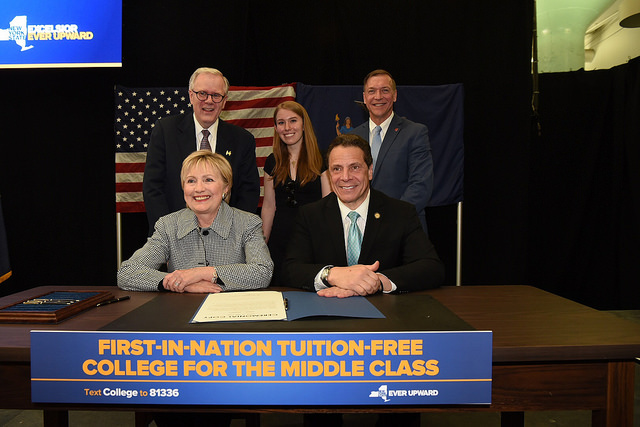
We’ve heard it all before. The cost of college is a major reason students choose to – or not to – attend any specific institution. SUNY is already one of the most affordable options in the country, but leadership in New York wants to do even more to cut costs. With the passing of New York’s 2018 fiscal year budget, an education at SUNY will now be tuition-free for hundreds of thousands of New Yorkers.

On April 8, it was announced that Governor Andrew M. Cuomo’s Excelsior Scholarship, a first-of-its-kind in the nation program, will provide tuition-free college at New York’s public colleges and universities to families making up to $125,000 a year. Today, the proposal was made official when the bill was signed into law by Governor Cuomo at LaGuardia Community College, with Hillary Clinton joining him at the event.
The first-in-the-nation plan will be phased in over three years, starting in the fall 2017 semester. In year one, the scholarship is available to New York families making up to $100,000 annually in the fall of 2017, increasing to $110,000 in 2018, and finally $125,000 in 2019.
SUNY has always stood for access. With our 64 campuses and more than 7,000 degree programs, all New Yorkers who seek a higher education can find a place at a SUNY school. Now, with the help of New York State, the Excelsior Scholarship will truly expand access even more and open new doors to students who may have not had a chance at a college education before.
With all of these new developments, we’ve put together a Frequently Asked Questions (FAQ) resource to help make things easier to understand and get you through the most common questions and concerns that arise when discussing the Excelsior Scholarship. Among the common questions are:
- What is covered by the Excelsior Scholarship?
- What are the requirements
- How many students are eligible?
You can find the answers to all these and more in our resource. As college decision day draws near (May 1!), we want all students to know that they have a home at SUNY.
[maxbutton id=”1″ ]




The kid that works hard and gets a merit based scholarship gets less of a benefit than the kid that doesn’t work hard. One kid who works hard and gets a $4300 merit scholarship will get about $2170 in Excelsior Scholarship and the one who doesn’t work hard gets the full $6470 Excelsior Scholarship. So will this discourage students from excelling?
The Excelsior Scholarship does us no good. When they decided to take income data from 2015 it placed us $86 above the initial $100,000 cut off. If they had used either 2014 or 2016 we would have qualified. Didn’t seem to matter whether I retired shortly after 2015, because there isn’t a income adjustment like the FAFSA uses. I am sure knowing someones income from over 2 year ago helps, just not sure how.
Is this true: The kid that works hard and gets a merit based scholarship gets less of a benefit than the kid that doesn’t work hard. One kid who works hard and gets a $4300 merit scholarship will get about $2170 in Excelsior Scholarship and the one who doesn’t work hard gets the full $6470 Excelsior Scholarship. So will this discourage students from excelling?